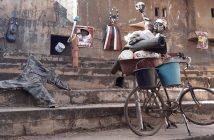« A man without memory is a man already dead »: these words from the film bring to mind a Fulani proverb that goes a child without memory’s poop will never be solid. Applied to a country, a generation that doesn’t know its past cannot build a future. It is with this awareness that Morocco opens the doors of its painful memory, that of the « dark years », the Seventies when political opponents were arbitrarily imprisoned like animals by the merciless authorities. Strengthened by this newfound openness, Moroccan cinema has unhesitatingly entered the movement and six films have been made in a short lapse of time. Two attempted the tricky exercise of historical reconstruction, at risk of freezing memory in the restoration of bygone days: La chambre noire by Hassan Ben Jelloun and Jawhara by Saad Chraïbi, which both portray the squalid jails and prisoners’ terror. Four others, on the contrary, adopt a more cinematographic distance, focusing more on the scars of memory and their effect on the present. The wonderful Mille mois by Faouzi Bensaïdi hints at without ever actually showing the scars that repression left, tainting a wounded generation’s vision of the world. Through his character Kamal in Face à face, Abdelkader Lagtaâ focuses on the amnesia provoked by this wound. With Mona Saber, Abdelhaï Laraki also goes in search of a confiscated memory, through the story of a young French woman looking for her biological father imprisoned during the dark years. And with Memory in detention, Jillali Ferhati progressively creates a link with this sidelined past, this imprisoned memory, again via an amnesiac, Mokhtar, whose body alone remembers. Unbeknown to him, his endless nosebleeds replay the violence of his arrest, mirroring all the blood shed. When he comes out of a prison he no longer wants to be separate from, young Zoubeir, painfully obsessed by the truncated memory of his murdered father, tries to help him find the thread again by taking him to the different places he went to in his past. But is Mokhtar what he seems? Thanks to an extremely clever plot that fills this road movie with real suspense, a double ambiguity sets in: is Mohktar a politician or a thief of the same name? Did he hand over his companions, and notably Zoubeir’s father, to escape torture? The veils, curtains and covers on screen create uncertainties and doubts that overcome Zoubeir.
Remarkably played by the filmmaker himself, who, without pathos, manages to restore all the physical burden of a memory in detention, Mohktar has the depth of a tragic character despite his silence. His trauma is inscribed in his body and no national reconciliation can repair it. There is no indulging any public or political discourse in his return to life. On the contrary, this character shows how the present liberation of historical speech requires an artistic reconstructing of an amputated memory if it is to take form, like Zoubeir who acts in the yard of a deserted prison. All monstration freezes and reduces what bodies are not able to forget. That is how Ferhati, in harmony with the fineness of this wonderful and necessary film, evokes arrests and torture only by fleeting – and above all systematically fragmentary and fragmented – flashes. Memory will not be a replaying of the past, but a letting the scars it has left resonate in the present.
This could be done by testifying so that this generation « that knows nothing, lives in fear one day and in innocence the next » – as said in the film – can learn what their parents went through. But that is the role of books and documentaries. By using fiction, Ferhati radically inscribes himself in the present.
It could be done with letters and objects, like those in the souvenir box that Mohktar never lets go of, but Ferhati scarcely exploits this overly scholastic solution: he prefers signs, gestures and looks that leave a veil of uncertainty and ambivalence. Mohktar waters the flowers and, confronted with Zoubeir’s insinuations, contents himself with blessing the rain for all the good it brings the gardens.
It could be done by returning to the crime scene but Ferhati does not want to be trapped in remembrance. Mohktar and Zoubeir cover a lot of ground but it is less at the stopping places and more on the road that the key moments of their confrontation take place, on a railway line or in a street at night. The widescreen format allows Ferhati to play on the perspectives and to enrich the image with signifiers without getting too close to the characters. This distance is very welcome: it enables him to avoid psychologism while maintaining their freedom of movements and their depth.
It is thus done essentially through moments of silence and the off-screen space, through all that remains unspoken in the relation, through the sound of the wind that makes the wind turbines turn, through the evocation of an encounter that can finally happen between Mohktar and the woman who is looking for him but that this cinema does not show us because its strength is to make us feel even more, so that the child evoked in Jillali Ferhati’s beautiful text at the end of the film – « indelible trace on the face of time, hair become white in the dark, chained lover, hungry for freedom »- can grow.








